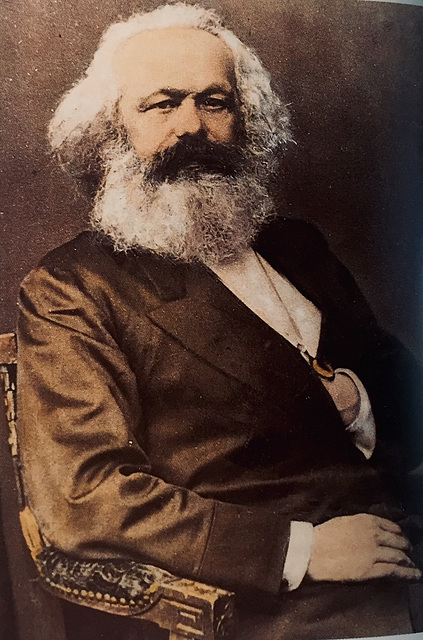POLARIZATION OF THE CLASSES
The Means of subsistence
The POWER of IDEAS
SHACKLED BY VALUE SYSTESM
FRIEDRICH NIETZSCHE
Yo, Ho, Neighbour....!
BERTRAND RUSSELL
Checking the Facts
LIVING TO THE FULL
Auto
Church
Prayer
JACQUES LACAN
KARL POPPER
Einstein
RUSSIAN DISSIDENTS
NATURE'S LEADERS
VOTES FOR WOMEN
TO DO IS TO KNOW
THE POWER OF BELIEF
VERIFIABLE STATEMENTS
SILENT THOUGHTS AND FEELINGS
A UNIQUE LOCATION IN SPACE AND TIME
Revolution in Europe
No news is good news
Hegel
Man's Oneness with Nature
Branch
Darwin
Darwin's study
Charles Darwin
Alfred Wallace, aged 46, in 1869
Beagle
Beagle
Charles Darwin
What is a Primitive World
Down House
Darwin's old study at Down
Mirror Test
The LEGACY of SCHOPENHAUER
ABOVE AND BEYOND
See also...
Keywords
Authorizations, license
-
Visible by: Everyone -
All rights reserved
-
13 visits
KARL MARX


In 1845 Karl Marx was expelled from France and Germany for his revolutionary activities. He eventually settled in 1849 in London, where he spent many hours in the Reading Room of the British Library. He is buried in Highgate Cemetry.
Erhard Bernstein has particularly liked this photo
- Keyboard shortcuts:
Jump to top
RSS feed- Latest comments - Subscribe to the comment feeds of this photo
- ipernity © 2007-2024
- Help & Contact
|
Club news
|
About ipernity
|
History |
ipernity Club & Prices |
Guide of good conduct
Donate | Group guidelines | Privacy policy | Terms of use | Statutes | In memoria -
Facebook
Twitter

One reason why Marxism was to prove such a rich system of thought was that it fused together three intellectual traditions that were each already highly developed: German philosophy, French political theory, and British economics. It can therefore not be categorized simply as “philosophy” in the normal sense. Nevertheless it contained a major immense influence on a great deal of subsequent philosophical thinking. So no history of philosophy in the modern era could possibly disregard it. ~ Page 165
The philosophical element in Marxism was nearly all taken from Hegel, and has continued from that day to this to be expressed by Marxists in Hegel’s terminology. It is worth giving a checklist of ideas that are at the heart of Hegelianism and are also central to Marxism: one, that reality is not a state of affairs but an ongoing historical process; two, that because of this, the key to understanding reality is to understand the nature of historical change; three, that historical change is not random but obeys a discoverable law; four, that the discoverable law to change in the dialectic, with its repeated triadic movement of thesis, antithesis, and synthesis; five, that what keeps this law perpetually in operation is alienation, which ensures that each successive state of affairs is eventually brought to an end by its own internal contradictions; six, that the process is not under the control of human beings, but is driven forward by its own internal laws, and human beings are swept along by it; seven, that the process is thus described will continue until a situation is reached in which all internal contradictions have been resolved: there will then be no alienation, and therefore no longer any force at work promoting change; eighty, that when this conflict-free situation is reached, human beings will no longer be swept along by forces outside their control, but will be able for the first time to take their destiny into their own hands, and will become themselves the arbiters of change; nine, that this will for the first time make human freedom and self fulfilment possible for human beings; the, that the form of society within which this freedom will be exercised, and self-fulfillment achieved, will not be the atomized society of independently functioning individuals that is envisaged by liberals, but an organic society in which individuals are absorbed into a whole that is much bigger and therefore more fulfilling, than their own separate lives. ` Page 165
Sign-in to write a comment.